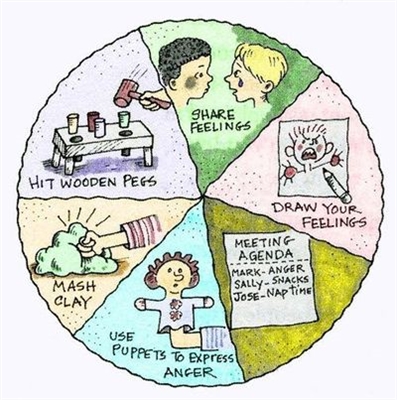In a world where money and settlement reign, sometimes there are people who go beyond all this. Making disinterested acts, they put themselves above mercantile spirit. Each of us has at least one altruist friend who sincerely helps others. But is it easy for him to live? Is it good or bad to take care of others? Maybe it makes sense to be like everyone else? Is it easy to recognize an altruist? Is it worth raising this quality in yourself? What if the child is altruistic? Do I need to retrain him? Unselfishly provide the necessary information.
Who is altruist?
An altruist is a man who disinterestedly does good deeds, sometimes even to the detriment of himself. Given the mercantile tendencies that are taking root deeper and deeper in the public consciousness, altruism is becoming an increasingly exotic phenomenon, giving way to pragmatism. On the other hand, it is impossible to say that it will disappear altogether - it is impossible, because altruistic behavior is widespread in nature, indicating the deep meaning of this phenomenon. What is its meaning?
Evolutionary biological species matter, not individual individuals. The self-sacrifice of some in the name of the survival of the whole group is genetically inherent. It makes no sense to save the life of one representative of the population, if all the others die. Therefore, the underlying genetic mechanisms that transform an individual into an altruist, or even a kamikaze, work.
This principle is even common at the cellular level. For example, the phenomenon of apoptosis is known, when a cell is destroyed at will, if it begins to interfere with the body. Altruism of one cell facilitates the life of the whole system.
But even in the animal world, altruism sometimes goes far beyond the evolutionary mechanisms. There are cases when cats and dogs take care of other young species (chickens, ducklings, squirrels, etc.). Such examples are widely found among other animals. This behavior has no specific adaptive meaning.
In people Altruism takes on even larger forms. For the first time this phenomenon was described by the French philosopher Auguste Comte, who carefully studied human behavior, creating the science of sociology. He was interested in the actions of people carrying benefits for others. According to his views, altruists act on the principle of "life for others." Such behavior is contrasted with egoism, widespread in society.
By the way, not everyone believes that altruism complicates human life. The fact is that the potential benefit from such behavior in the long term significantly exceeds the effort expended in committing a good deed. The altruist is often respected and trusted in society. Many people, inspired by his efforts, are trying to do a good deed in return. In developed countries, helping people is becoming very popular. Many wealthy citizens are attached to charity, proud of the title of philanthropist.
If altruists were an unviable part of the population, they would simply disappear under the influence of social selection. This is not happening. Moreover, many social institutions, including the church, purposefully educate altruists, since society without them simply cannot survive.
The highest degree of altruism is self-sacrifice., that is, sacrificing oneself for the common good. Such actions are transformed into legends, which are retold from generation to generation. Like Danko, the character of the story "The Old Woman Izergil", who sacrificed her burning heart to save others.
Thus, there is hardly a person who will say "Altruist? Who is this?", Because we all, in one way or another, have come across similar people. Just expressed their activity in different directions. About this and talk further.
Types of Altruism
Given the complexity and diversity of this phenomenon, there is quite an extensive classification of it. It is conditionally possible to distinguish two large groups: demonstrative (for example, the "love" of many politicians towards their people) and true altruism. The latter, in turn, is divided into a number of species:
- Moral (moral) - relating to his own conscience;
- Parental - connected with taking care of children;
- Sensual - associated with sympathy or sympathy;
- Mutual (reciprocal) - is characteristic for communication between friends;
- Rational - caused by the understanding of the correctness of good deeds;
An altruist can do good, because this is what his “inner censor” suggests to him, either experiencing deep sympathy for a person, or logically understanding the correctness of such behavior. For example, the phrase “there is no other people's children” can be considered a manifestation of rational altruism. Wise parents understand that his friends and comrades play a big role in shaping their child. Accordingly, they logically come to the conclusion that by caring for those children, their health and socialization, they indirectly contribute to the development of their own baby.
By the way, altruism has certain gender differences. An altruist woman is more likely to show concern for loved ones. The altruistic man is more inclined to situational feats (during war, fire, catastrophes, etc.).
There is a philosophical trend called effective altruism. His followers analyze the most productive ways to improve the world. This teaching can be considered a rational form of virtue, in contrast to charity. It is aimed at achieving the maximum increase in the total social good within the framework of all humanity.
How to recognize the altruist
Defining an altruist is not so difficult. Only for this time must pass. If a person regularly commits noble and disinterested acts, without demanding anything in return, then, most likely, he is an altruist. Such people are distinguished by developed empathy, that is, the ability to sense the emotional state of another person, to perceive his need for help.
If in order to maintain "kindness" you need votes, the purchase of certain goods and services, or something else in this spirit, then we are talking about a pseudo altruist who is simply trying to seem so. The undisputed "leader" in this antirating is the policy, the essence of which lies in the refined "game" with the electorate.
Most often, disinterested help comes from parents, friends and loved ones. These people primarily claim the role of altruists, since it is from them that they are most expected to receive support and care.
In the case of kinship, child care is laid at the genetic level and contributes to the continuation of the species. There is such a thing as kin selection or the aggregate fitness of closely related individuals (when it comes to animals). The dedication of some individuals increases the survival of others. In human society, this is manifested in caring for their loved ones.
Friends generally become altruistic, realizing the reciprocity of this feeling. They know that they themselves can count on help, so they will gladly come to the rescue in order to strengthen this confidence. If we talk about lovers, then altruists make them complex biochemical processes that “suggest” how to behave with the object of desire.
There are more complex social forms of altruismexpressed in love for the motherland or a particular people. In describing this phenomenon, the term pro-social behavior is used. For example, volunteers who spend their time on helping others, or patrons who provide material support for the development of sports, science and the arts.
There are cases when people go even for self-sacrifice for the sake of social well-being. Often, they become heroes in the minds of their countrymen. Although, at times, their sacrifice turns out to be in vain, only strengthening the conviction of certain people that altruism is harmful. Of course, such statements cannot be absolutized, but they also contain a rational grain.
Is it good or bad to be an altruist?
Many publications have been written about the strengths and weaknesses of altruism. Some consider this phenomenon natural and necessary for life in society. Others point out its flaws that complicate a person’s life. Let us examine both versions of whether to be an altruist.
The benefits of altruists
Many researchers are convinced that selfless assistance to people has a number of advantages in the long run. Among them:
- Good reputation in the community;
- Clear conscience;
- Feeling happy in helping others;
- Safer life;
- Response help from others;
- Trust from others;
- Ability to change the world for the better.
Of course, not every altruist feels these bonuses. Many of them come across the realities of a pragmatic world. It is not the perception of a simple inhabitant of high life values and causes a number of disadvantages.
Disadvantages of altruists
Getting into a bad environment, the altruist risks being deceived. His noble impulses can cynically use, and then also "spit in the soul." The main disadvantages include:
- Devaluing yourself and your interests;
- Possible negative consequences;
- Taunt from the mercantile environment.
Given these disadvantages, rational altruism can be considered optimal, which allows you to do good deeds on your “fresh mind” without being sprayed before unworthy people. Still, getting an altruist in your inner circle is real luck.
How to behave with the altruist
First of all, any relationship should be built on the principle of mutual respect. Altruist is also a man, not a servant or a robot. If he gives support, you need to express gratitude. Still, many are accustomed to the fact that good deeds are rewarded. Therefore, subconsciously waiting for the moral "compensation" of the effort expended. Of course, the altruist is not looking for benefit in his actions, but he is counting on human relations. And conscience will be exactly the way to treat him.
If this is a close friend or relative, it is worth explaining to him that it is not worth being too kind, because bad people can use it. In the mercantile world, to teach someone to be a little more pragmatic is also a good deed.
How to raise an altruist
Continuing the previous topic, we note that the education of the altruist is not an easy task. On the one hand, society needs kind and disinterested people. On the other hand, it’s not always easy for them. Maybe it makes sense to rehabilitate the altruist, teaching him selfishness?
This is also not an option, because the egoists do not like. Of course, a person should think about himself, but for society, more important are people who benefit others. Society stimulates the development of altruism. From birth, people read fairy tales where most of the heroes provide disinterested help to people, save beauties and protect their land. Even in adult years, there are mechanisms for the education of altruists. The most effective is religion, instilling the values of mutual respect and helping one's neighbor.
Raising a child, first of all, it is worth understanding what he wants. The egoist will not leave the altruist and vice versa. Breaking the character and personality of a person is a real crime. It is necessary to explain to the child all the strengths and weaknesses of his behavior, to suggest how he can succeed. Helping others can also be "wisely", without stepping over themselves and their interests. This is the previously mentioned rational altruism, which does not allow a person to waste his life resources. But, again, everyone has his vocation in life, and if someone feels happy, helping others - this is his personal choice and lifestyle.
The benefits that altruist brings to society are measured not only by his personal efforts. More importantly, his actions contribute to the rethinking of values by others. Helping someone, a person, in addition to a specific act, starts a series of good deeds. Like a smile, which causes the appearance of other smiles, so examples of charity inspire similar behavior.



